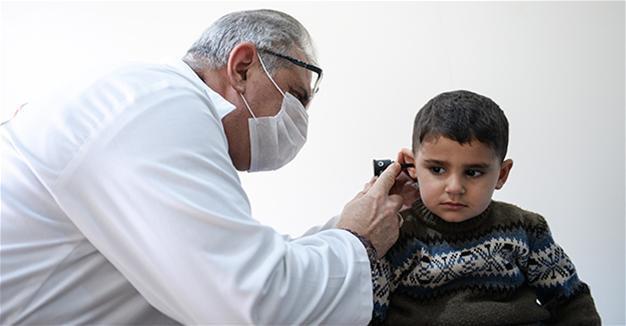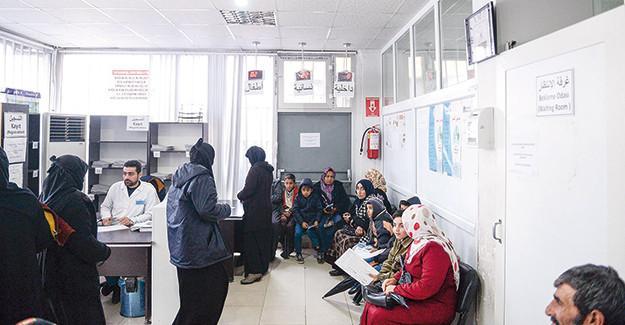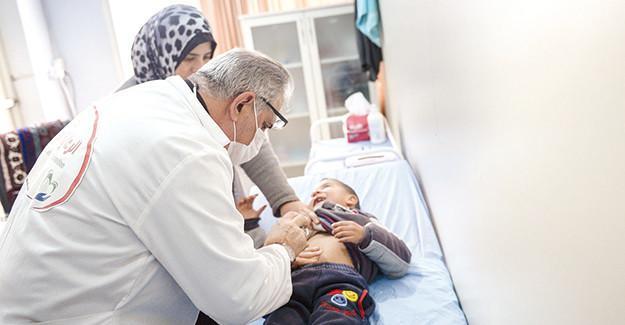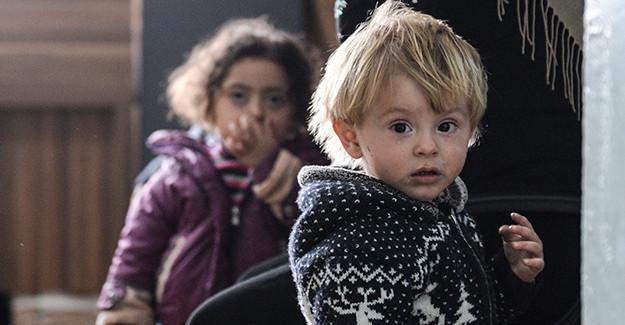Syrian doctors help Syrian refugees in Turkey with support of 50 NGOs
Zeynep Bilgehan

Photo Credit: Levent Kulu
Syrian doctors and other medical professionals, who have survived the unbridled war in their country, are helping their countrymen recover physically and mentally to embark on a new life in several facilities in southern Turkey with the support of 50 non-governmental organizations.
Some 91 percent of at least three million Syrian refugees in Turkey have been living outside refugee camps, according to recent reports.
Refugees’ needs have been met by 50 registered international organizations since 2012. One of them, the International Medical Corps (IMC), has been working on health, psychical rehabilitation, nutrition, psychosocial support, and the protection of women and children in the capital Ankara, and the southeastern border provinces of Hatay, Gaziantep, Kilis and Şanlıurfa for the past five years.
Some 32,500 Syrian refugees every month have been able to receive free service from nine medical clinics located in the border provinces. Syrians are given access to state hospitals too, however, prefer to receive treatment from these clinics due to language barriers they face in Turkish state hospitals, according to the IMC.
The IMC, a registered international aid organization, opened a clinic in Hatay’s Reyhanlı district, but was only given a license last year. A Turkish doctor in charge of the clinic visits the hospital once a week for inspection. The clinic is prohibited from serving Syrians without ID cards. The clinic hosts 400 patients on average every day, where seven Syrian doctors are currently working.
Nihat Varan, an IMC official, said the Syrian doctors had to work as practicing physicians and not as doctors as they left their diplomas in Syria.
Muhammed Hussein, one of the doctors who could not be entitled as a professional doctor, said he had worked for 34 years as a doctor and had retired before the war in Syria, noting that he was earning $950 per month.
One of the other practitioners, Hafez El Selah, an ophthalmologist, said he missed conducting surgeries.
“I was living in Deir-ez Zour before ISIL [the Islamic State of Iraq and the Levant] invaded it. I was always very busy. I missed doing surgeries,” he said.

One of the only registered clinics in Gaziantep is in the Nizip district. A nurse, Meise, who works at the clinic, said she considered herself lucky.
Ziya Alkord, a Turkish senior doctor at the clinic, said Syrian refugees relied more on Syrian doctors than Turkish ones.
“Our pharmacy is free. Cases of post-traumatic stress disorder, sexual assault and violence against women are rife here. But we have successfully increased the legal marriage age from 12 to 19,” he said.
A physical rehabilitation center and its mobile crews served 3,550 disabled people each month. Among its patients was a little girl who lost a leg after a bomb exploded while she was playing in a street in Damascus. With the help of the center, she is trying to recover.
The IMC’s women’s centers have been providing service to women survivors of sexual abuse and physical violence, with 2,000 women on average receiving treatment from one women’s center in Kilis each month. Najlaa Sheekh, the founder of the center, said they found solidarity among each other.
“There are a lot of women who have lost their husbands, children, fathers and brothers here. Earlier, we were pouring out our grief to each other. Afterwards, there were 45 of us and we founded this center,” she said.

Women can also receive training in hairdressing, make-up, stitching, and language classes in the center.
The frequenters of the center said their ambitions were to become doctors, engineers or teachers, before the war.
“We started from scratch here. We are supporting our families by hairdressing. We want to open our own hairdresser salons one day,” women from the center said.
Some of the women said they were happy living in a safe country and wanted to be granted citizenships, while some criticized that Turkey prohibited polygamous marriages, which some of them said they supported as it was legal and a tradition in Syria. However, most working women said they opposed becoming second wives to their husbands.
Turkey hosts scores of Syrian organizations. One of them, Watan, has been working on providing education to children left out of schools since 2012. The founder of the organization, Iyad Agha, said 40 percent of the Syrians in Turkey needed help. He stressed that many refugees in Europe were unhappy, and 90 percent of the refugees in Turkey did not consider leaving Turkey for Syria.
The Turkey director of the U.K.-based Save the Children, Nick Fenney, said Turkey would lead the world in humanitarian work.
“Almost 95 percent of our aid workers are Turkish citizens. Turkish aid workers will be wherever a humanitarian crisis occurs,” he added.
IMC Turkey Director Serdar Dinler said integration and development works successfully emerged with the support of humanitarian aid.
“Turkish people have showed their hospitality. AFAD [Disaster and Emergency Management Authority] and Red Crescent are very professional. But the emergency process has passed. Now the time is integration and development. They need hope,” he said.




